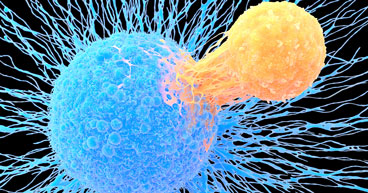
Of the billions of people in the world, there is only one you. And while you may share similar tastes with and even look like someone else, you are physically different from anyone, thanks to your genes. They determine your eye and hair color (and if you keep your hair) and how tall you are. They also send instructions to your cells to help regulate blood pressure and other body functions. Your genes make you you.
Your genes may also be at the root of some diseases you may be diagnosed with, including cancer. Genetic mutations, either inherited or acquired over time, may result in damage to proteins in cells that allow them to grow unchecked, leading to tumors or a preponderance of damaged cells that overwhelm healthy cells, including those in your blood or immune system.
For decades, doctors turned to chemotherapy, radiation therapy and surgery to poison cancer cells, irradiate them or physically remove them. These treatments have been refined over the years, resulting in positive outcomes for millions of cancer patients.
But when researchers were able to map the human genome—the 23 pairs of chromosomes located in a cell’s nucleus—it ushered in the era of cancer treatment using precision medicine, an amorphous and potentially confusing concept for some patients.
Precision medicine allows doctors to home in on the DNA of a cancer cell and potentially identify the mutations and characteristics of that tumor and what may be driving that cancer’s growth. Then, theoretically, doctors can prescribe treatments that target those characteristics with specific treatments.
“There are differences between patients, and precision medicine is about getting down to understanding why those differences exist and being able to use that information to refine a person's care,” says Alan Bryce, MD, a Medical Oncologist and Chief Clinical Officer at City of Hope® Cancer Center Phoenix. “Not all cancers are the same and every patient's different.
Now we have a better understanding how they're different.”
In this article, we’ll take a closer look at precision medicine and explore the following topics:
- Personalized medicine
- How does precision medicine work?
- Examples of precision medicine
- What are the disadvantages of precision medicine?
- Precision medicine and rare cancers
If you’ve been diagnosed with cancer and are interested in a second opinion on your diagnosis and treatment plan, call us or chat online with a member of our team.
Personalized medicine
Any good craftsman will tell you to use the right tool for the right job. For decades, however, doctors treating cancer knew what the job was, but in some cases didn’t always have the tools precise enough for that specific job. One patient with breast cancer may have been treated very similarly to another patient with breast cancer because the differences in their cancers may have been unknown.
Enter precision medicine, sometimes referred to as personalized medicine (though some researchers draw a distinction between the two).
Using various tools and tests, doctors are able identify how one breast cancer or colorectal cancer or lung cancer may be different from another.
“Precision is just about being more specific about what's going on and based on that precise knowledge, you might decide to change treatment,” Dr. Bryce says. “You might decide to do immunotherapy. You still might decide to do chemotherapy. But it's about being more precise about how you’re going to treat this specific patient compared to every other patient.”
How does precision medicine work?
We are surrounded by cancer risk factors every day. Processed foods, tobacco smoke, air pollution, even sunlight may increase our risk for developing cancer. And if we are diagnosed, we may never know what caused our disease.
But doctors now may be able to determine what’s driving a cancer’s growth, which genes are out of whack and whether they have a therapy that can target that specific cancer
“The one-size-fits-all approach to cancer treatment is quickly becoming a thing of the past,” says Maurie Markman, MD, President of Medicine & Science, City of Hope Atlanta, Chicago and Phoenix. “It is being replaced with medications and treatments targeted directly to a patient’s individual DNA.”
Clinicians use a variety of tests and tools on blood or tissue samples to find specific characteristics that may be driving a cancer’s growth, including those listed below.
Advanced genomic testing is designed to find DNA alterations that may be driving a cancer’s growth.
Genetic testing is performed to determine if a patient has an inherited genetic mutation that may increase cancer risk or help explain how cancer developed.
Examples of precision medicine
If testing has identified a DNA anomaly or mutation in a patient, doctors need to determine if they have a treatment to target it. That’s where the aptly named targeted therapy may be used. Targeted therapy drugs are designed to attack specific alterations and mutations to reduce their ability to drive the tumor’s growth. Examples of targeted therapy include those listed below.
Trastuzumab is designed to block the HER2 proteins often found in breast and other cancers.
Bevacizumab attacks the VEGF protein found in multiple cancers, including cervical cancer and colorectal cancer.
Imatinib is considered one of the first targeted therapies and was frequently used to treat leukemia. It has since been replaced by newer, more refined drugs.
Pembrolizumab is an immunotherapy drug called an immune checkpoint inhibitor. It prevents cancer cells from avoiding the immune system. It may be used to treat lung cancer, melanoma and many other cancers. Pembrolizumab was the first cancer drug approved to treat cancers with specific characteristics rather than their point of origin.
In some cases, researchers have identified driver mutations in cancer but have yet to develop drugs to target them. For instance, mutations in the gene TP53 are found in many cancers, but there is no targeted therapy for it.
Only recently, regulators have approved a new drug to target the elusive KRAS mutation, once considered “undruggable.” In 2021, the Food and Drug Administration (FDA) approved the drug sotorasib (Lumakras®) to treat certain cases of non-small cell lung cancers that contain the KRAS mutation with a G12C variant. It marks the first drug in history approved to treat cancer with any kind of RAS-family gene mutation. It is only approved for lung cancer and not other cancers that have that mutation.
What are the disadvantages of precision medicine?
It’s hard to look at the downside of precision medicine when it has been so beneficial to so many patients. But tinkering with cell function to treat cancer may trigger serious side effects. Potential side effects include:
Immunotherapy treatments designed to jump-start the immune system to attack cancer cells may cause an autoimmune response—when immune cells attack healthy tissue.
Also, some precision medicine drugs are very expensive.
Precision medicine and rare cancers
The era of precision medicine has flipped the perceptions about rare and common cancers upside down. Research has shown that some cancers long considered common are just a collection of rare subtypes that happen to share the same origin. Advances in immunotherapy have also led to new treatments for some rare cancers that once were difficult to treat. And advanced genomic testing has revealed molecular features in some rare cancers that may be treated with drugs previously developed for more common forms of the disease.
“The definition of rare cancers has changed over time, both because of the role of genomic testing and evidence that different subtypes provide clinically meaningful information that impacts treatment and outcomes,” Dr. Markman says.
While deepening their understanding of a specific cancer’s blueprint, scientists and oncologists have discovered that some so-called common cancers may not be that common at all. “Common cancers are being subclassified into clinically relevant, molecularly defined subgroups, and might lose their common cancer designation as a result,” the author of a 2016 article on rare cancers wrote in The Lancet Oncology, adding that “rare is the new common in the post-genomics era.”
For instance, melanoma, is the fifth most common cancer diagnosed in the United States, with more than 90,000 new cases a year. But scientists have broken down melanoma into multiple subtypes, each with unique DNA mutations. Melanoma “is a collection of rare cancers, each with a unique biology with distinct implications for therapy—an increasingly common pattern in oncology,” the researchers wrote. Each of these subtypes would be considered rare cancers under National Cancer Institute guidelines.
Genomic analyses of a rare cancer may also unveil common mutations found in a variety of cancers, which may lead to new treatments.
“We may be seeing treatments for rare cancers based on genomic analysis initially conducted on many common cancers or where the mutations are more commonly observed,” Dr. Markman says.
Stephen Lynch, MD, Intake and Primary Care Physician and Vice Chief of Staff at City of Hope Cancer Center Phoenix, encourages patients to take control of their diagnoses and learn as much as they can about their cancer.
“Many times, whether it is a common cancer or a real oddity, a lot of patients really don’t understand it,” Dr. Lynch says. “They’ve been told they have breast cancer. Well, breast cancer is many different diseases. They’ve been told they have lung cancer. That’s many different diseases. So, first and foremost is helping the patient understand the foundation of their disease.”
As scientists and researchers delve deeper into the genomics of each cancer, they are finding that every cancer, like every patient, has unique characteristics that often require individualized treatments. Dr. Lynch says it’s important to educate patients on what makes their specific cancer tick.
“Digging into that diagnosis and helping patients learn about the unique molecular aspects of their tumor will help them better understand what they are dealing with and what questions to ask,” he says.
If you’ve been diagnosed with cancer and are interested in a second opinion on your diagnosis and treatment plan, call us or chat online with a member of our team.


